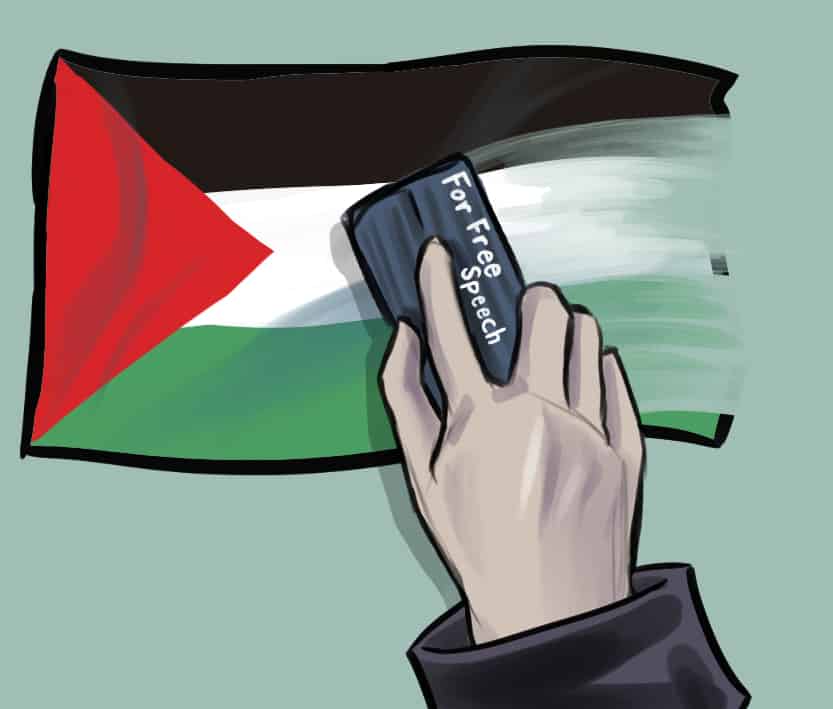Content warning: This article discusses graphic accounts of the violence in Palestine.
In the wake of an 11-day conflict between Israel and Palestine in May, The Varsity interviewed four students with families in the Gaza region on their experiences viewing the conflict from abroad. Students reported a sense of anxiety and despair for their families, as well as a feeling that it is difficult to talk freely about Palestine and Palestinian issues at U of T.
Generational trauma
This past May, the long-standing Israeli-Palestinian conflict escalated intensely. 256 Palestinians and 13 Israelis were killed in the fighting.
UTM student Sarah Hashish recalled anxiously watching the news at around 4:00 in the morning as reports of hostilities in Gaza continued. Hashish tried to understand what was happening, shivering in anxiety for the people near her home village in Palestine.
Hashish, whose aunts and uncles live in the West Bank, told The Varsity that after two 15-year-olds were shot near her home village, she was terrified. “You never know the extent of force that military occupation forces will use against these people,” she explained.
Hashish added that one of her cousins was arrested three years ago because he was in possession of fireworks he purchased to celebrate his sister’s graduation. “That is the scariest part for me: not being able to really feel like there is a line where my family will be safe if they don’t cross it,” said Hashish.
Though the students The Varsity spoke to did not experience the war firsthand, many of them talked about experiences of trauma within their family, both past and present.
Amina*, who asked to remain anonymous to avoid harassment, is a Jordanian citizen whose grandmother is Palestinian. She told The Varsity that her grandmother experienced the ‘Nakba’ — the Arabic word for catastrophe. Nakba is the term used to refer to the destruction of Palestinian society and homeland in 1948 when most Palestinians were displaced as a result of the 1948–1949 Palestine War. Amina’s grandmother was separated from the rest of her family during the Nakba, and her sisters were dispersed into different countries, including Egypt, the United States, and Kuwait.
Given that her grandmother was forcibly evicted from her home at the age of 13, Amina said that “seeing [the forced evictions] happen now in real time feels surreal… It just makes you think: how did my family survive all this trauma?” In the past, forced evictions of Palestinians in Jerusalem have led to widespread protest.
Nahil Al-Zuhaika, the president of UTM APS, has family in Gaza and the West Bank. She also had a personal connection to the mass arrests reported in Palestinian territories under Israel’s ‘law and order’ campaign in May. Around 2,000 of the 3,100 arrests were made in the internationally recognized Green Line demarcation boundary, which Palestinians recognize as their territory.
Al-Zuhaika told The Varsity that the husband of her father’s cousin was arbitrarily arrested by military police, who suspected that a worker in his store was affiliated with Hamas. He was not personally involved, according to Al-Zuhaika.
“When… something happened to someone close to me, someone in my family, that’s when I kind of [felt] like the reality set in,” said Al-Zuhaika.
“You’re expected to just go on about your day, do your courses, study, work and pretend everything’s fine and live your life normally,” Al-Zuhaika added. “I’ll be sitting at my desk… And in my head, [I’ll think], right now their lives are in danger, right now they’re being bombed. And I don’t know if they’re alive? [It’s] exactly that feeling of helplessness.”
Culture of silence
In an interview, Lina Lashin, the co-founder of The Palestine Forum, a U of T group working on research and discourse related to Palestine, noted that there is ongoing ignorance around Palestine at U of T.
“There’s all this silence from our administration,” Lashin explained. It hurts Palestinians at U of T, Lashin added, to see the institution they are a part of to remain silent on their cause when it has both the capacity and expertise to support justice in the region.
“Admins and faculty and a lot of the professors that were silent on this… are people that [we] as students learn from and see as role models,” Lashin said “And when a very, very big and significant event takes place in their area of expertise, and they’re silent about it, you start to think and understand, in many ways, that it’s probably because it’s Palestine.”
Lashin also brought up the fact that U of T has received scrutiny for allegedly halting the hiring process of Dr. Valentina Azarova for the position of director of the International Human Rights Program (IHRP) in the Faculty of Law after a donor expressed concerns about her work on Israel’s occupation of Palestine. U of T has since re-offered the position to Azarova, and she has declined it.
Hashish, who studies political science, claimed professors avoid talking about Palestine in the classroom because they are worried about external pressure. “There [are] big lobby groups that will suppress, boycott and blacklist these professors,” said Hashish, “Even saying that Palestinians deserve human rights… is suddenly a political issue.”
The Scarborough Campus Students’ Union referred a motion to condemn the Canary Mission to its Executive Committee during its June board of directors meeting. The Canary Mission is a group which identifies and doxxes those whom it labels as antisemitic at colleges and universities across the continent, usually due to involvment with the Boycott, Divestment, Sanctions movement against Israel.
Amina said that, as a student with Palestinian heritage, it frustrates her to realize that she feels fearful about discussing Palestine because of the culture at U of T.
“Palestinian children deserve dignity, and Palestinian advocates deserve the same academic freedom and unrestricted scope of principles that apply to all the other academics,” added Lashin.
*Name changed due to fear of harassment and retribution
— With files from Tahmeed Shafiq


